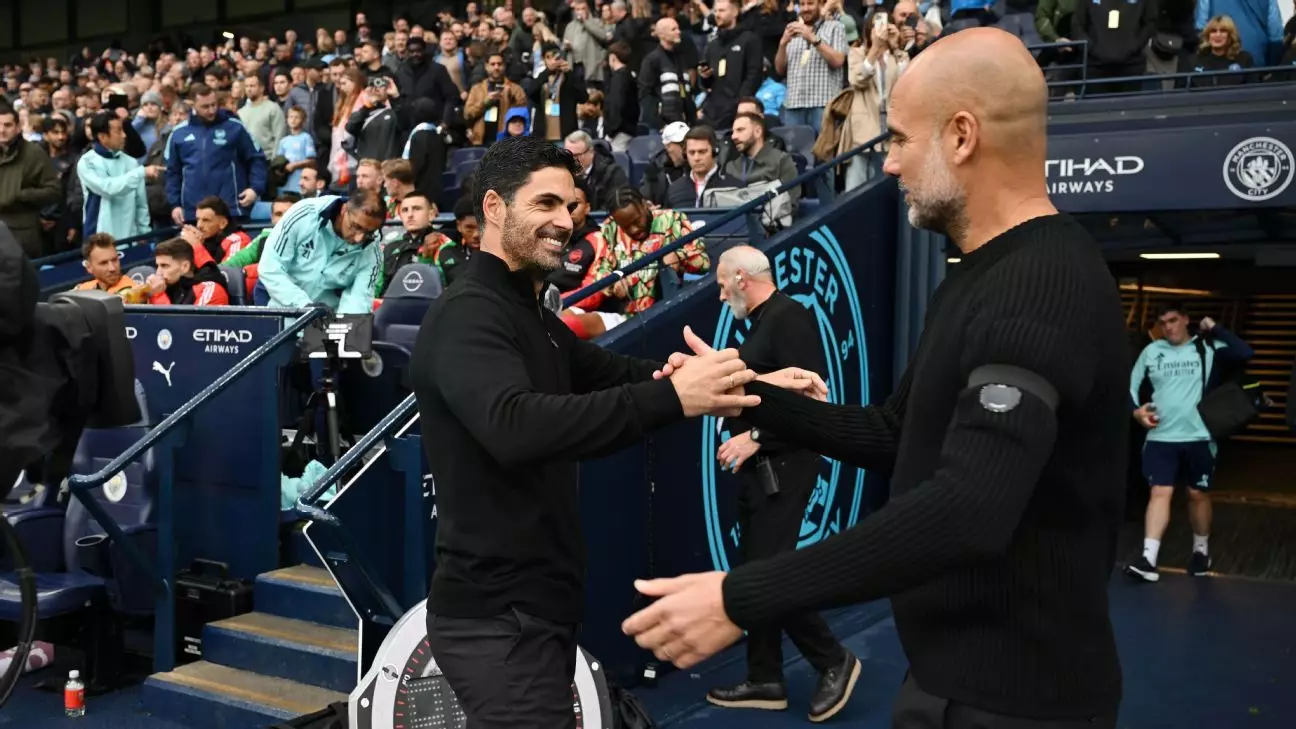In the world of elite sports, friendships often become casualties of intense competition, particularly when coaching rivals clash on the pitch. Mikel Arteta, however, remains steadfast in denouncing claims that his rivalry with Pep Guardiola will disrupt their personal relationship. The Arsenal manager, who previously served as an assistant coach to Guardiola at Manchester City, articulated his sentiments during a recent press conference, emphasizing that the integrity of their friendship transcends the fierce dynamics of title contention. Their bond, which flourished in the shared competitive environment of City, symbolizes mutual respect and admiration despite the stakes of their professional engagements.
Arteta’s reflections are noteworthy, particularly amid the heightened tensions following a gripping 2-2 draw between Arsenal and Manchester City. This match, a microcosm of two seasons’ worth of rivalry, resulted in criticism from City players regarding Arsenal’s tactics—an expected defensive strategy, given the scenario of playing with ten men after Leandro Trossard’s red card. This incident illustrates the emotional turbulence within professional sports, where even the best athletes may momentarily lose composure amidst high-pressure situations. Yet, Arteta’s reaction serves as a reminder that emotional responses are part and parcel of the sport, but should neither erode camaraderie nor hinder professional commitments.
Arteta’s assertion that professional rivalry should not spill over into personal relationships underlines a critical aspect often overlooked in modern sports: the necessity of separating personal feelings from professional obligations. He stated, “If our relationship was damaged because one draws and the other wins… I would not talk to him anymore.” This sentiment sheds light on the mental fortitude required by sporting professionals. It hints at the greater responsibility they bear as public figures to model exemplary behavior—demonstrating that disagreements, whether tactical or strategic, can coexist with respect and goodwill.
This perspective raises pertinent questions about the nature of competition in sports. Can athletes truly compartmentalize their professional animosities from their personal relationships? Arteta’s confidence suggests a growing maturity among leaders in sports, who recognize that skills and respect can often exist hand-in-hand. His comments can encourage younger athletes to understand that respect and interpersonal relations do not have to suffer due to competitive fervor.
As the footballing season progresses, maintaining a cohesive team dynamic becomes just as critical as the relationships between coaches. Arteta took time to address injury concerns regarding key players ahead of Arsenal’s fixture against Leicester City. Players like Jurriën Timber and Ben White are set to return, reinforcing the squad’s strength, while summer signing Mikel Merino is also showing signs of recovery post-injury. His observation that Merino is “ready to go” exemplifies the hope that comes with recovery, which can invigorate the entire squad heading into critical matches.
Equally pressing is the uncertainty surrounding goalkeeper David Raya’s fitness for the impending game. Arteta’s cautious approach—considering not only the player’s enthusiasm but also the medical team’s assessments—echoes the broader theme within professional sports of balancing ambition with realistic expectations. High-stakes decisions regarding player fitness not only impact the team’s performance but also reflect a commitment to player health and longevity. This strategy conveys that the individual player’s well-being remains paramount, even when fighting for league positions.
Ultimately, Mikel Arteta’s insights extend beyond the context of Arsenal and Manchester City, reflecting broader themes in sportsmanship. His remarks on balancing competition with healthy relationships convey an important message: irrespective of the fierce nature of rivalry, mutual respect should reign supreme. Whether in relationships among coaches, players, or fans, professionalism must guide every interaction. As Arteta focuses on his duties as Arsenal’s head coach while managing player dynamics, it is clear that the foundation of sports lies in both competition and collaboration—a delicate equilibrium that shapes not only games but also the very essence of athletic camaraderie.

